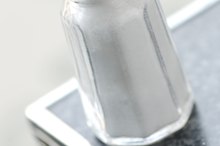The Vitamins & Minerals Found in Kelp
Kelp, a brown leafy edible seaweed that grows along colder coastlines, has been used for thousands of years in traditional medicine to treat a variety of health issues. It started to gain interest as a supplement in the 1980s when sea vegetables became a popular form of supplementation. As with any supplement, discuss using kelp with your doctor.
Traditional Use
Kelp has been used in Asian cooking for thousands of years. In Chinese is is called kunbu and is one of the main seaweeds used in the Chinese medicine 2. Traditional Chinese medicine uses kelp to treat enlarged thyroid glands, swelling, cysts, liver problems, tumors and phlegm. In the 18th century, when kelp's iodine content was discovered, conventional medicine used it to treat goiter, an enlarged thyroid, typically caused by iodine deficiency in the diet.
- Kelp has been used in Asian cooking for thousands of years.
- In the 18th century, when kelp's iodine content was discovered, conventional medicine used it to treat goiter, an enlarged thyroid, typically caused by iodine deficiency in the diet.
Vitamins
Foods Rich in Potassium Iodide
Learn More
In 2 tbsp.,1/8 cup, of fresh, raw kelp there is 0.3 mg vitamin C, 0.005 mg thiamin, 0.015 mg riboflavin, 0.047 mg niacin, 0.064 mg pantothenic acid, 18 mcg folate, 1.3 mg choline, 1 mcg vitamin A, 0.09 mg vitamin E and 6.6 mcg vitamin K. To put this in perspective, comparing the amounts to the Recommended Daily Allowances of an adult male, 2 tbsp. of raw kelp provides 0.3 percent vitamin C, 0.42 percent thiamin, 1.2 percent riboflavin, 0.3 percent niacin, 1.3 percent pantothenic acid, 4.5 percent folate, 0.2 percent choline, 0.1 percent vitamin A, 0.4 percent vitamin E and 5.5 percent vitamin K.
Minerals
In 2 tbsp., 1/8 cup, of fresh, raw kelp there is 17 mg calcium, 0.28 mg iron, 12 mg magnesium, 4 mg phosphorous, 9 mg potassium, 23 mg sodium, 0.12 mg zinc, 0.013 mg copper, 0.02 mg manganese, and 0.1 mcg selenium. Comparing these amounts to the Recommended Daily Amounts of an adult male, 2 tbsp. fresh, raw kelp provides 1.7 percent calcium, 3.5 percent iron, 3 percent magnesium, 0.6 percent phosphorus, 0.2 percent potassium, 1.5 percent sodium, 1 percent zinc, 1.4 percent copper, 1 percent manganese, and 6.7 percent selenium. The mineral kelp is known for is iodine because 2 tbsp. raw kelp contains between 500 and 8,000 mcg of iodine, which is 300 percent to 5,333 percent of the recommended amount for an adult male.
- 1/8 cup, of fresh, raw kelp there is 17 mg calcium, 0.28 mg iron, 12 mg magnesium, 4 mg phosphorous, 9 mg potassium, 23 mg sodium, 0.12 mg zinc, 0.013 mg copper, 0.02 mg manganese, and 0.1 mcg selenium.
Kelp as a Supplement
Gout and Iodine
Learn More
The high natural iodine content of kelp makes it a natural food or supplement to combat iodine deficiency. Because the amount of iodine varies so much in kelp, be aware you could experience iodine toxicity if you eat too much. Two or three servings a week should provide ample iodine to the diet, notes VeganHealth.org 3. Kelp is marketed as a weight loss aid by apparently helping to reduce cravings, and there are claims that it can help prevent cancer and other diseases as its high vitamin and mineral content help the body to regenerate, reports the American Cancer Society 1. At this time, there is no reliable clinical evidence to prove these claims.
- The high natural iodine content of kelp makes it a natural food or supplement to combat iodine deficiency.
Related Articles
References
- American Cancer Society; Sea Vegetables; Nov. 1, 2008
- ITM Online; The Traditional and Medicinal Value of Seaweeds Used in Chinese Medicine; Subhuti Dharmananda, Ph.D.; December 2002
- VeganHealth.org: Iodine
- Seaweed, kelp, raw. FoodData Central. U.S Department of Agriculture. Published April 1, 2019.
- Cherry P, O’Hara C, Magee P, McSorley E, Allsopp P. Risks and benefits of consuming edible seaweeds. Nutr Rev. 2019;77(5):307-329. doi:10.1093/nutrit/nuy066
- Admassu H, Gasmalla MAA, Yang R, Zhao W. Bioactive peptides derived from seaweed protein and their health benefits: Antihypertensive, antioxidant, and antidiabetic properties. J Food Sci. 2018;83(1):6-16. doi:10.1111/1750-3841.14011
- Thomas I, Siew LQC, Watts TJ, Haque R. Seaweed allergy. J Allergy Clin Immunol Pract. 2019;7(2):714-715. doi:10.1016/j.jaip.2018.11.009
- National Institutes of Health Office of Dietary Supplements. Iodine. Updated December 6, 2019.
Resources
Writer Bio
Allison Buck has been writing since 2002. Her work has been published on the Weider Nutrition Group Canada's website. She completed a Bachelor of Arts degree at the University of Guelph, followed by a postgraduate program at Humber College in television arts and science, specializing in writing.









